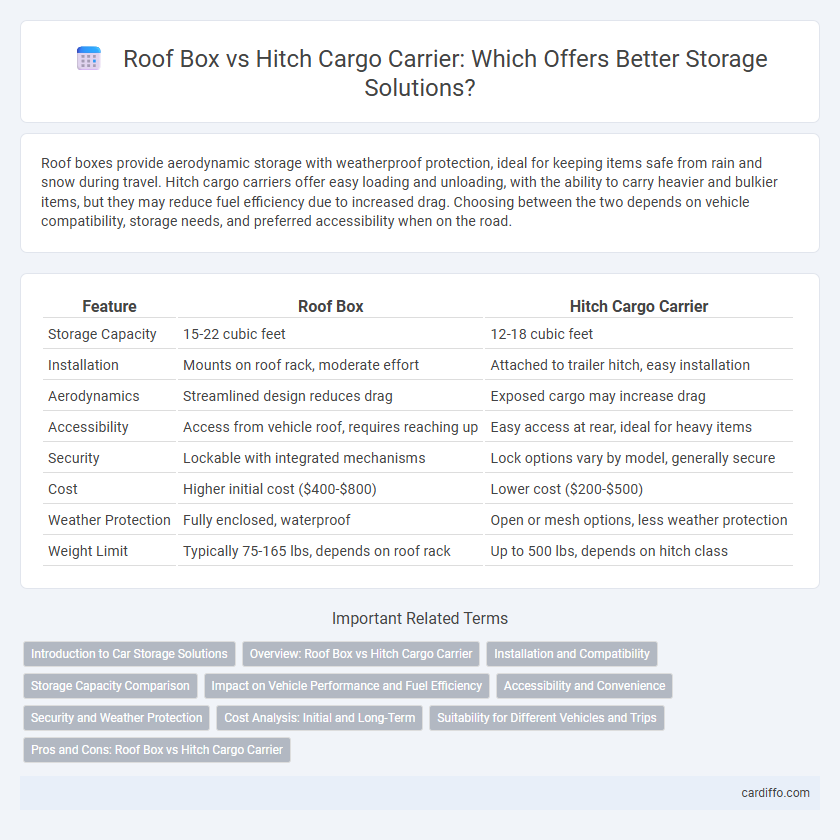Roof boxes provide aerodynamic storage with weatherproof protection, ideal for keeping items safe from rain and snow during travel. Hitch cargo carriers offer easy loading and unloading, with the ability to carry heavier and bulkier items, but they may reduce fuel efficiency due to increased drag. Choosing between the two depends on vehicle compatibility, storage needs, and preferred accessibility when on the road.
Table of Comparison
| Feature | Roof Box | Hitch Cargo Carrier |
|---|---|---|
| Storage Capacity | 15-22 cubic feet | 12-18 cubic feet |
| Installation | Mounts on roof rack, moderate effort | Attached to trailer hitch, easy installation |
| Aerodynamics | Streamlined design reduces drag | Exposed cargo may increase drag |
| Accessibility | Access from vehicle roof, requires reaching up | Easy access at rear, ideal for heavy items |
| Security | Lockable with integrated mechanisms | Lock options vary by model, generally secure |
| Cost | Higher initial cost ($400-$800) | Lower cost ($200-$500) |
| Weather Protection | Fully enclosed, waterproof | Open or mesh options, less weather protection |
| Weight Limit | Typically 75-165 lbs, depends on roof rack | Up to 500 lbs, depends on hitch class |
Introduction to Car Storage Solutions
Car storage solutions such as roof boxes and hitch cargo carriers enhance vehicle capacity for extra luggage, sports gear, or camping equipment. Roof boxes offer aerodynamic design and weather protection, maximizing rooftop storage without obstructing rear access. Hitch cargo carriers provide easy loading and unloading with customizable options for heavier or bulkier items, making them ideal for diverse travel needs.
Overview: Roof Box vs Hitch Cargo Carrier
Roof boxes provide aerodynamic storage mounted on the vehicle's roof, ideal for protecting gear from weather and maximizing security, with typical capacity ranging from 10 to 25 cubic feet. Hitch cargo carriers attach to the rear hitch receiver, offering easy access and generally supporting heavier and bulkier items, with load capacities often between 300 to 500 pounds. Choosing between roof boxes and hitch cargo carriers depends on vehicle size, storage needs, and ease of loading, with roof boxes favoring streamlined storage and hitch carriers excelling in heavy-duty transport.
Installation and Compatibility
Roof boxes require secure mounting on crossbars compatible with various roof rack systems, providing versatility but often involving more complex installation. Hitch cargo carriers attach directly to a vehicle's trailer hitch, offering straightforward installation with minimal tools and ensuring compatibility primarily with vehicles equipped with a hitch receiver. Choosing between the two depends on vehicle type, ease of installation, and intended cargo size, with hitch carriers typically supporting heavier loads.
Storage Capacity Comparison
Roof boxes typically offer between 12 to 22 cubic feet of storage capacity, making them ideal for bulky items like camping gear or skis. Hitch cargo carriers generally provide around 8 to 15 cubic feet of space but can accommodate heavier loads due to their lower mounting position. Choosing between a roof box and a hitch cargo carrier depends on specific storage needs and vehicle towing capacity.
Impact on Vehicle Performance and Fuel Efficiency
Roof boxes increase aerodynamic drag, leading to reduced fuel efficiency by up to 20% and may affect vehicle handling due to additional weight on the roof. Hitch cargo carriers, mounted lower behind the vehicle, tend to have less impact on fuel economy and stability but can limit rear visibility and require a hitch receiver. Choosing between the two depends on balancing cargo needs with acceptable fuel consumption and driving dynamics.
Accessibility and Convenience
Roof boxes provide secure, weather-resistant storage accessible from the vehicle's rooftop, ideal for keeping luggage organized and dry during travel. Hitch cargo carriers offer easier access at bumper height, allowing quick loading and unloading without climbing or reaching overhead. Both options enhance storage capacity, with roof boxes maximizing aerodynamics and hitch carriers offering practical convenience for frequent access.
Security and Weather Protection
Roof boxes provide superior weather protection with their fully enclosed, aerodynamic design that shields belongings from rain, snow, and dust. Hitch cargo carriers often offer less protection, being open or partially covered, which can expose items to the elements and debris during transit. Security-wise, roof boxes typically feature integrated locking systems that deter theft more effectively than most hitch-mounted carriers, which may have simpler or no locks.
Cost Analysis: Initial and Long-Term
Roof boxes generally have a higher initial cost ranging from $400 to $1,200 compared to hitch cargo carriers, which cost between $300 and $700. Long-term expenses favor roof boxes due to better aerodynamics reducing fuel consumption, whereas hitch carriers can increase drag and fuel costs. Maintenance for roof boxes is minimal, while hitch carriers may require additional upkeep, such as hitch alignment and securing hardware replacements.
Suitability for Different Vehicles and Trips
Roof boxes offer versatile storage solutions compatible with most vehicles equipped with roof racks, making them ideal for family cars and SUVs on long road trips requiring ample luggage space. Hitch cargo carriers attach to the vehicle's trailer hitch, providing easy access and stability, best suited for trucks and SUVs frequently transporting heavy or bulky gear for outdoor activities. Choosing between the two depends on vehicle type, trip duration, and cargo size, ensuring optimal storage without compromising driving safety or fuel efficiency.
Pros and Cons: Roof Box vs Hitch Cargo Carrier
Roof boxes offer aerodynamic design and weather protection, making them ideal for keeping luggage secure and dry on long trips, but they can reduce fuel efficiency and affect vehicle clearance. Hitch cargo carriers provide easy loading and unloading with minimal impact on roof space or vehicle height, yet they may obstruct rear access and typically have lower weight capacity compared to roof boxes. Choosing between the two depends on factors like vehicle type, storage needs, and driving conditions.
roof box vs hitch cargo carrier Infographic

 cardiffo.com
cardiffo.com